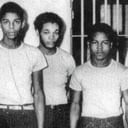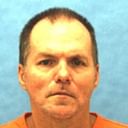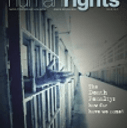by Ira Saletan
Friends Committee on Legislation of California
reprinted from the FCL Newsletter, June 2003 edition
FCL Development & Outreach Coordinator Ira Saletan recently met with Greg Wilhoit, who served four years on Oklahoma’s death row. Following are excerpts from their conversation, augmented with details from writings by and about Greg Wilhoit.
IS: What were the circumstances that put you on death row in Oklahoma?
GW: On May 31, 1985, my wife Kathy was found raped and murdered in Tulsa, Oklahoma. We had been separated for three weeks and had two young daughters. No one had seen anyone entering or leaving the apartment that night. No physical evidence collected at the crime scene matched me. Almost a year after Kathy’s death I was arrested for her murder, allegedly based on a bite mark. I was devastated. Trying to raise two infant daughters on my own plus working full-time as a journeyman ironworker had kept me very busy, but not busy enough that I didn’t have time to dwell on how horribly wrong my life had gone.
I was charged with first degree murder and the prosecution sought the death penalty. Depression set in and almost consumed me. It was only by God’s grace that I was able to survive the emotional roller coaster that I rode for the next 18 months until my capital murder trial.
I hired two lawyers, paying them almost everything I had except for my home. As the trial date drew near, it became clear the lawyers hadn’t done their work and I fired them.
All they wanted me to do was enter a guilty plea, despite the fact that I had pleaded not guilty. I hired another attorney, who also turned out to be incompetent. I felt helpless and defeated. I felt I was going to be convicted and there was nothing I could do about it. The experts against me were very convincing. If I had been on the jury, I wouldn’t have hesitated to find me guilty.
The jury was out only two hours before they returned with a guilty verdict. Before the punishment phase, I was given an opportunity to explain why my life should be spared. I spoke, but presented no other witnesses. As a Christian, feeling secure in my afterlife, I indicated I would rather die than spend the rest of my life in prison for a crime I did not commit.
I was sentenced to be executed by lethal injection, but I was shaken even more when the judge told me that I might be electrocuted, hung or shot if necessary. This would prove to be the most sobering moment of my life.
IS: What was significant about your experience inside?
GW: I had supported the death penalty my entire life, but I had no idea what awaited me. I entered death row at the Oklahoma State Penitentiary in July 1987. With my hands and feet shackled, I found myself in a rotunda of cells four stories high. I was then led to cell #13, the only home I would know for the next four years. I figured I was never getting out.
Soon after arriving on death row, things began to change for the better. Mark Barrett, the Public Defender appointed to handle my appeal, became a trusted friend. His work would eventually result in the release from death row of both me and my friend Ron Williamson, an event which had never occurred before in Oklahoma.
For the first three years I was on death row, I continued to strongly support the death penalty, as I did earlier in my life. I was clearly in the minority among the inmates, and we had heated arguments about this. But I got into more trouble for playing my TV late than my views on the death penalty.
When I first met Barrett, I told him I would rather be put to death than live for years on death row, and would not pursue the appeal process if the first appeal failed. While experts determined that the key evidence against me did not support my guilt and light appeared in my case, another inmate faced his death. Chuck Coleman was to be the first Oklahoman executed in almost 30 years. His crimes were horrible, but I considered him a friend.
When he was killed, I was overwhelmed with grief. I had an epiphany, which led to a great change in my views on the death penalty. I now feel this was a religious experience. Executing him hadn’t solved anything. The world was not a safer place to live. Life without parole would have made much more humane sense. State-sanctioned murder is simply wrong.
It is only by God’s grace that I escaped execution. In 1991, I was granted a new trial. It was almost two more years before my second trial. The judged rendered a directed verdict of innocence. “Mr. Wilhoit, you are free to go,” said the judge. My nightmare was over, after my family and I had lived for almost eight years with this tragedy and its aftermath.
IS: Why do you believe the death penalty is wrong and should be abolished?
GW: I feel the death penalty is strictly a punitive measure. It is not a deterrent to crime, a view supported by getting to know over 100 death row inmates. The death penalty is applied arbitrarily and inconsistently through our criminal justice system in ways that have a discriminatory impact on the poor and minorities. These cases are coming to light now, in part because of the study in Illinois and Governor Ryan’s actions. If Kathy’s murder had been committed just 200 yards south in another county, I was told that I probably would have never been charged in the first place because of the different evidence standards and practices there.
Ron Williamson, my friend from death row, sued and received an unprecedented wrongful conviction compensation award from Oklahoma. The Oklahoma legislature has passed a statute enabling exonerated inmates to file claims of this kind, but it has not yet been approved by the governor.
IS: What has been most difficult and rewarding about your experience since your release?
GW: I’m a better person for having spent time on death row. I got off drugs and got straightened out. I manage to live on Social Security [disability]. Living on the periphery of society seems to suit me.
I have been out more than 10 years. The toughest parts have been re-assimilating into society, and dealing with emotional and psychological damage from my experience. I lost the opportunity to raise my two daughters. I never received an apology or a dime of compensation. I struggled for about five years, and have been in counseling for post-traumatic stress syndrome. A key to turning things around was getting involved in the abolitionist movement against the death penalty, working with Death Penalty Focus and others.
I love living here in Northern California. I’ve met people full of compassion and tolerance. Sharing my experience with others is very rewarding. I enjoy educating others and growing as I do this work. Every time I tell my story, it validates my experience. I tell what happened to me, how I feel, and let people draw their own conclusions.
I was at the death penalty hearing in April where former Illinois Governor Ryan testified, along with Nick and Amanda Wilcox of Penn Valley. I spoke on May 1 on the Capitol steps during the Moratorium Day rally.
I’ve done interviews with TV programs, including 48 Hours, 20/20, and Good Morning America. I’ve spoken at schools, colleges, congregations, and at other groups and events, mostly in California. It’s taught me the importance of being prepared and having confidence.
I believe I’m the only former death row inmate doing this kind of outreach against the death penalty west of the Mississippi River. I hope to have some company soon. I am thankful to my family and friends, both old and new, for sticking with and supporting me through all this, as well as the community of Public Defenders. Ellen Eggers and Rita Barker of the California State Public Defender’s Office in Sacramento have been important allies.
Although I enjoy living in California, I am disturbed that we have so many people stacked up like cordwood on our state’s death row. Now Governor Davis wants to spend many millions on creating an even bigger death row at San Quentin, where I just visited for the first time. I admire what Governor Ryan did in Illinois, but I’m not optimistic that California will do away with the death penalty unless public opinion shifts significantly. The politicians, after all, usually follow rather than lead.
I would like to see the day that the death penalty is abolished. I doubt it will be in my lifetime, but I want to use my life to contribute as I can to this cause that I believe in.



